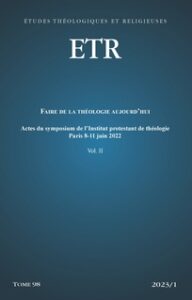Bien qu’ils appartiennent à deux générations différentes du mouvement socialiste-religieux, Paul Tillich (1886-1965) et Paul Ricœur (1913-2005) ont conçu leurs engagements politiques en termes théologiques largement similaires. Leurs affinités électives sont particulièrement notables dans leurs efforts respectifs pour évaluer la portée théologique du thème d’une autoabolition du christianisme dans la société séculière. Marc BOSS* rappelle les formulations programmatiques de ce thème chez Richard Rothe (1799- 1867) avant d’en examiner les déclinaisons critiques chez Tillich et Ricœur.
Phrase : La réception critique de l’idée d’une autoabolition du christianisme dans la société séculière chez Paul Tillich et Paul Ricœur.
Mots-clés : Paul Tillich, Paul Ricœur, Richard Rothe, sécularisation, éthique théologique, théologie de la culture
Although they belong to two different generations of the socialist-religious movement, Paul Tillich (1886-1965) and Paul Ricœur (1913-2005) conceived their political commitments in broadly similar theological terms. Their elective affinities are particularly notable in their respective efforts to evaluate the theological significance of the theme of a self-abolition of Christianity in secular society. The author recalls the programmatic formulations of this theme in Richard Rothe (1799-1867) before examining its critical variations in Tillich and Ricœur.
Keywords : Paul Tillich, Paul Ricœur, Richard Rothe, secularization, theological ethics, theology of culture
p. 89-105
Auteur
BOSS Marc
Marc BOSS a été maître de conférences en théologie systématique et en dogmatique à l'Institut protestant de théologie, Faculté de Montpellier. Depuis 2014, il est maître de conférences en éthique et en philosophie et directeur du Fonds Ricoeur à l'Institut protestant de théologie, Faculté de Paris. Il est membre du Centre de recherches interdisciplinaires en sciences humaines et sociales (CRISES – EA 4424).
